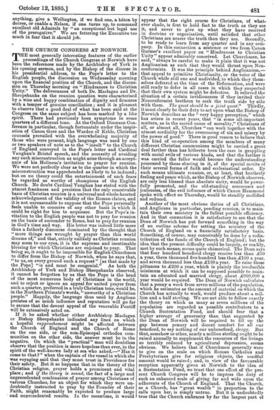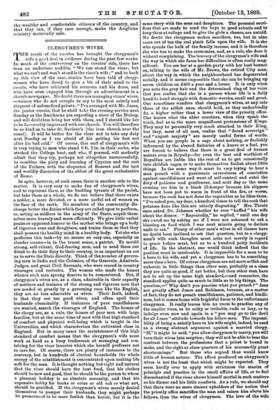THE CHURCH CONGRESS AT NORWICH.
THE most generally interesting features of the earlier proceedings of the Church Congress at Norwich have been the references made by the Archbishop of York in his opening sermon, and by the Bishop of the diocese in his presidential address, to the Pope's letter to the English people, the discussion on Wednessday morning upon the financial position of the Church, and the discus- sion on Thursday morning on "'Hindrances to Christian Unity." The deliverances of both Dr. Maclagan and Dr. Sheepshanks on the reunion question were characterised by a wise and happy combination of dignity and firmness with a temper of genuine conciliation ; and it is pleasant to observe that a good deal of what has been said at the Congress on the same subject has been marked by a like spirit. There had previously been symptoms in some quarters of a different tone. At the Oxford Diocesan Con- ference in particular, though fortunately under the inspir- ation of Canon Gore and the Warden of Keble, Christian counsels prevailed with the overwhelming majority of those who were present, high language was used by one or two speakers of note as to the " insult " to the Church of England conveyed in the Pope's letter and Cardinal Vaughan's Bristol speech, and the necessity of avoiding any such misconstruction as might arise through an accept- ance of his Holiness's invitation to prayer for reunion. We were not perfectly clear as to the quarter in which the misconstruction was apprehended as likely to be induced ; but on no theory could the entertainment of such fears be regarded as worthy of champions of the English Church. No doubt Cardinal Vaughan has stated with the utmost frankness and precision that the only conceivable basis of Christian reunion is a universal and whole-hearted acknowledgment of the validity of the Roman claims, and it is not unreasonable to suppose that the Pope personally feels unable to conceive of any other basis in which it could be right for him to acquiesce. But the Pope's in- vitation to the English people was not to pray for reunion on the basis of surrender to Rome, but to pray for reunion in God's time and way. His letter was indeed little more than a fatherly discourse dominated by the thought that "more things are wrought by prayer than this world dreams of," and that, utterly unlikely as Christian reunion may seem to our eyes, it is the supreme and inestimable blessing for which Christians are enjoined to pray. That being so, it ought to be impossible for English Churchmen to differ from the Bishop of Norwich, when he says that, " to us, on every ground such a request" [as that made by the Pope] "is and must be congenial." As both the Archbishop of York and Bishop Sheepshanks observed, it cannot be forgotten by us that the Pope is the head of the most numerous body of Christians in the world, and to reject or ignore an appeal for united prayer from such a quarter, preferred in a truly Christian tone, would be, in the Northern Primate's words, "unworthy of a Christian people." Happily, the language thus used by Anglican prelates of so much influence and reputation will go far to secure that the devout appeal of the venerable Pontiff will be extensively acted on. If it be asked whether either Archbishop Maclagan or Bishop Sheepshanks indicated any lines on which a hopeful rapprochement might be affected between the Church of England and the Church of Rome on the one side, or the non-Episcopal orthodox com- munities on the other side, the answer must be in the negative. On which the "practical" man will doubtless observe that the position is more hopeless than ever, in the spirit of the well-known lady at sea who asked,—" Has it come to that ?" when the captain of the vessel in which she - was voyaging said that they must trust in Providence for their safety. But it so happens that in the theory of the Christian religion; prayer holds a prominent and vital place ; and if the theory ie sound, the fact of a large and unprecedented combination of prayer among Christians of various Churches, for an object for which they were un- doubtedly instructed to pray by the Founder of their Faith, might reasonably be expected to produce large and unprecedented results. In the meantime, it would appear that the right course for Christians, of what- ever shade, is first to hold fast to the truth as they see it, and never to give up what they have received in doctrine or organisation, until satisfied that other Christians are nearer the truth than they are. Secondly, to be ready to learn from any quarter and in any com- pany. In this connection a sentence or two from Canon Garmer's excellent paper on " Hindrances to Christian Unity" appear admirably conceived. Let Churchmen, he said, " always be careful to make it plain that it was not Anglicanism as such that they would thrust upon Non- conformists. It was the principle behind Anglicanism,— that appeal to primitive Christianity, or the voice of the Church while still one and undivided, to which they them- selves deferred at the time of the Reformation, and were still ready to defer in all cases in which they suspected that their own system might be defective. It relieved the situation of a certain invidiousness if they invited their Nonconformist brethren to seek the truth side by side with them. The quest should be a joint quest." Thirdly, it must clearly be their duty to act upon what the Bishop of Norwich describes as the " very happy perception," which has arisen in recent years, that "in some all-important matters, as in the sacred cause of morality," Christians of all, or almost all, Churches " can work together with the utmost cordiality for the overcoming of sin and misery by the power of good." There is good reason to believe that this kind of co-operation among the members of many different Christian communions might be carried a great deal farther than has hitherto been the case in grappling with social evils of various kinds, and that the farther it was carried the fuller would become the understanding possessed by those sharing in it, of the special merits of their several forms of faith and ecclesiastical order. By such means ultimate reunion, or, at least, that brotherly feeling and peace which, as the Bishop of Norwich observes, are only less blessed than absolute unity, would be power- fully promoted, and the old-standing sorenesses and jealousies, of the evil influence of which Canon Hammond spoke with effect on Thursday, would be steadily mollified and reduced.
Another of the most obvious duties of all Christians, and Anglicans in particular, pending reunion, is to main- tain their own ministry in the fullest possible efficiency. And in that connection it is satisfactory to see that the Dean of Norwich has put forward something in the way of an outline scheme for setting the ministry of the Church of England on a financially satisfactory basis. Something, of course, may conceivably be done by a redis- tribution of the funds of the Church of England ; but the idea that the present difficulty could be largely, or readily, met by such means, seems quite chimerical. The Dean says that four hundred beneficed clergy receive less than £50 a year, three thousand five hundred less than £100 a year, and seven thousand less than £130 a year. To raise these pittances to £200 a year, which is plainly the irreducible minimum at which it can be supposed possible to main- tain an educated and married clergy, about £900,000 a year would be required. The Dean of Norwich calculates that a penny a week from seven millions of the population, which he estimates as the amount of material on which the Church has actually to work, would produce about a mil- lion and a half sterling. We are not able to follow exactly the theory on which as many as seven millions of the population are regarded as possible contributors to a Church Sustentation Fund, and should fear that a higher average of generosity than that suggested by the Dean of Norwich will be required to fill up the gap between penury and decent comfort for all our beneficed, to say nothing of our unbeneficed, clergy. But that, somehow or other, nearly a million sterling ought to be raised annually to supplement the resources of the livings so terribly reduced by agricultural depression. seems obvious. We believe that if Churchmen generally were to give on the scale on which Roman Catholics and Presbyterians give for religious objects, the needful amount would be raised ; and, in view of the favourable reception apparently given at Norwich to the idea of a Sustentation Fund, we trust that one effect of the pre. sent Church Congress will be to impress the duty of such an enhanced scale of giving far and wide upon the adherents of the Church of England. That the Church, as a Church, has " great wealth " in proportion to the calls upon her, is simply untrue. But it is undoubtedly true that the Church embraces by far the largest part of
the wealthy and comfortable citizens of the country, and that they can, if they care enough, make the Anglican ministry materially safe.



















































 Previous page
Previous page